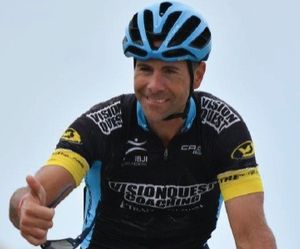We just wrapped our local spring “climbing” camp in the beautiful town of Galena, Illinois. We had great roads, low traffic, good weather and challenging terrain, but the toll on the athletes was substantial and caused many of them to question the choice after day one. Here’s why…
Many athletes are used to riding at 17-20mph and covering 100 miles in 5-6 hours. However, when encountering steep hills, heavy roads and temperatures vastly different from the typical ride, a mindset shift becomes important. Our athletes had to rewire their thinking a bit when the 90-degree heat hit on day one. Plus, we had added climb after climb at double-digit grades. Their power started eroding, crushing their confidence. Sooner or later this happens to every athlete. When the expectation and reality are incongruent, the first thought is usually panic! Day one of our camp was the perfect storm to create that panic for many of the VQers:
● The ride time was early afternoon instead of our typical early morning and that threw their bodies into small tailspins while also requiring some rethinking of nutrition, daily routines and body clocks to a different time = first strike against them.
● Pile on humid 90-degree temperatures when Chicago had been nasty cold and rainy thus far in 2019.
● With the bad weather at home, many VQers had not been riding outside and, even though many use the same bike indoors, the motion on a trainer is not the same as the motion on a road.
● HILLS! We just don’t get the chance to ride a lot of climbs in Chicago and due to the different body positions while going up and down hills, our muscles (and bodies) were easily fatigued. And that fatigue also impacted bike skills.
● The group dynamic on the road was different since we had a collection of different riders. When you get around a new group of cyclists, no matter who you are, you ride a little differently while adjusting--depending on personality, some ride easier, some ride harder, but different, nonetheless.
To say the first day was a struggle for many of us would be an understatement. It took us close to 4 hours to complete the 45 miles with many of the crew calling it quits before the end. You can imagine the mood at dinner that night with many folks contemplating whether or not they wanted to get back on the bike the next morning. This is when a strategy for encountering stress is super important.
One thing I teach all my athletes is to have a mechanism that kicks in when challenges arise. This mechanism is a checklist of things that create positive outcomes during rides. The checklist can vary a bit from event to event, but in general, it really does apply to most things in life:
1. Consider the elements needed for success (e.g., nutrition, gearing, position) by asking yourself: Do I have these dialed in?
2. Relax and breathe: Am I in control of my breathing? Can I create a more stable and intentional breath pattern?
3. Evaluate your mindset: Am I in a negative thought loop? Am I appreciating this experience and looking for ways to think about it more positively?
The key element to any memorable experience is to persevere and even stretch while helping others do the same. Now at a camp, where many are outside their comfort zones, this is achieved a bit easier. The collective group makes the struggles easier. I’m happy to report the crew did more than persevere the next day--they thrived! With a couple challenges not present on day two (heat and depart time), they were able to adjust to the new challenges, support each other and ride very well even though there were more climbs on a much longer course. Hats off to all of them for adjusting expectations and making it a great day!
I think this proves that when we find ourselves in uncomfortable situations that don’t match our expectations, we tend to over-rotate and our thoughts can make it way worse than it actually is. This is when your mental mechanism won’t just help you get through the experience; it will help you enjoy it. Remember to use those opportunities to engage your mental mechanism and really allow it to help make the most of your experience…whatever it might be.
Ciao~
Robbie

